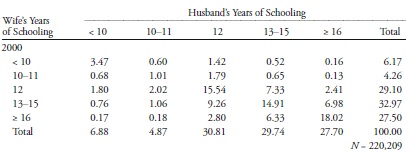When education correlates with a good outcome, labor economists are usually eager to publicize the fact. There is, however, one glaring exception. Labor economists rarely announce that the well-educated are more likely to marry a well-educated spouse – and capture a big chunk of the financial benefits of their partner’s transcript.
The most obvious explanation for this omission is that the spousal education gradient is weak. But the opposite is true. Here’s a revealing table from Schwartz and Mare’s “Trends in Educational Assortative Marriage from 1940 to 2003” (Demography, 2005).
Assume you’re going to marry someone. Then if you only have a high school diploma, your probability of marrying a college grad is about 9% for both men and women. With a 4-year college degree, in contrast, your probability of marrying a college grad is roughly 65%. Quite a difference.
Of course, this pattern probably isn’t entirely causal. But a large causal effect is highly plausible. Indeed, there are two credible causal channels: convenience and compatibility. Convenience: If you’re a college grad, you’re more likely to meet fellow college grads. Compatibility: If you’re a college grad, you’re more likely to hit it off with whatever college grads you happen meet.
Now suppose that only half of the raw probability difference is causal. This still means that if you finish college, you’re a full 28 percentage-points ([65-9]*.5) more likely to marry a college grad than a high school grad. You could even say that the average college grad who plans to eventually marry can expect to enjoy the financial benefits of 1.28 sheepskins, rather just one. As long as the gender earnings gap continues, this marital return is larger for women than for men. But given modern women’s high employment rates, the marital return is clearly a big deal for men, too.
Why is the marital return so rarely discussed by either economists or laymen? Probably because talking about the marital return is self-defeating. The more you talk about it, the more you sound like a gold-digger – and the more you sound like a gold-digger, the less marriageable you become! The thoughtful response to the evidence, though, is neither denial nor gold-digging. Instead, the evidence underscores an age-old adage: Don’t marry for money; go where the rich people are and marry for love.


READER COMMENTS
Randall Parker
Feb 18 2014 at 12:36am
Marry for the genes your spouse will give your children.
Shane L
Feb 18 2014 at 6:52am
I believe this has been discussed in terms of income inequality: a tendency for men and women from high-earning careers to pair up, over a period when female participation in the market has increased, may have caused household income inequality to increase.
KnowPD
Feb 18 2014 at 7:43am
The MRS degree!
Hazel Meade
Feb 18 2014 at 8:41am
This might exaplin the large number of people who get degrees in subjects that provide no marketable skills. It’s not about signalling, it’s about marrying up.
Go to college, meet your spouse, marry a spouse with a college education.
For a certain class of women, getting a college degree isn’t so much about having a career, as it is about having interesting things to talk about at cocktail parties and at dinner parties where you are entertaining your husband’s colleagues. It’s finishing school dressed up in modern clothing.
Finch
Feb 18 2014 at 10:31am
> This might exaplin the large number of people who
> get degrees in subjects that provide no
> marketable skills. It’s not about signalling,
> it’s about marrying up.
It’s also a precommitment to not letting your work consume you. An undergraduate degree in premed, for example, pretty much guarantees a difficult life for a decade or so. An art history degree does not. If your ambition is to be a great provider, you’d choose one path, if you want to marry that great provider, you’d choose the other.
Floccina
Feb 18 2014 at 12:32pm
So people who are very worried about inequality should push for college degrees to be made easier and more enjoyable to get, and for graduate degrees much harder to get.
NZ
Feb 18 2014 at 1:39pm
I’ll bet educational attainment corresponds closely with moving away from natural support networks. Either you move away to go to college, or you move away to get the job that your college degree signals you are now qualified for.
When the female “MRS” degree-holder gives birth, she no longer has her friends/family/in-laws around to help out. And these days she also likely doesn’t go to church either, so there goes another natural support network.
This places higher childcare costs directly on the couple. (Often, some of these are differed onto taxpayers.) Do these costs approach the college earning premium? Do they surpass it?
These are educated folks, and they often wind up making the educated choice: delay childbearing, and only have 1 or 2 when the time comes.
If we want people to be having more kids, sending more people to college is a bad idea.
Hazel Meade
Feb 18 2014 at 11:17pm
So people who are very worried about inequality should push for college degrees to be made easier and more enjoyable to get, and for graduate degrees much harder to get.
Not if they have to take out 100,000 in debt to get a degree. Are you marrying an income or a lein?
I think another possible big contributor to inequality is rising housing prices.
New homebuyers have a more difficult time building equity, while people who already own their homes (paid off) get all the benefits of owning an asset they can use as collateral, AND not paying rent or interest.
If housing prices started rising at some discrete point, then people who owned property before that point would tend to pull ahead economically, while those who didn’t would be stuck having a substantial portion of their income consumed by rent and interest payments.
Comments are closed.